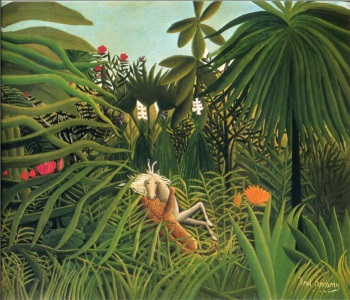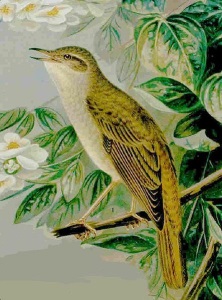| 1 | Sous les noirs acajous, les lianes en fleur,
| | Under the black mahoganies the vine abloom, |
| 2 | Dans l’air lourd, immobile et saturé de mouches, | In air that’s heavy, stale and congested with flies, |
| 3 | Pendent, et, s’enroulant en bas parmi les souches,
| Hangs down, and rolling up amid the stumps it lies,
|
| 4 | Bercent le perroquet splendide et querelleur,
| Cradling the grumpy parrot with his splendid plume, |
| 5 | L’araignée au dos jaune et les singes farouches. | The yellow-bodied spider, and the wild monkeys. |
| 6 | C’est là que le tueur de bœufs et de chevaux,
| The killer of the cow and horse, residing there, |
| 7 | Le long des vieux troncs morts à l’écorce moussue,
| Along the mossy bark of ancient trunks that crack, |
| 8 | Sinistre et fatigué, revient à pas égaux.
| Wicked and weary, he returns stepping with care, |
| 9 | Il va, frottant ses reins musculeux qu’il bossue ;
| He goes, rubbing and hunching his strong back. |
| 10 | Et, du mufle béant par la soif alourdi,
| And, from his gaping jaw that thirst has tired, |
| 11 | Un souffle rauque et bref, d’une brusque secousse,
| A hoarse, sharp breath that in a sudden blast |
| 12 | Trouble les grands lézards, chauds des feux de midi,
| Troubles great lizards, hot from noontime fire, |
| 13 | Dont la fuite étincelle à travers l’herbe rousse.
| Whose flight sparks through the reddish grass. |
| 14 | En un creux du bois sombre interdit au soleil
| Into a gloomy hollow, closed to the sun |
| 15 | Il s’affaisse, allongé sur quelque roche plate ; | He settles, extended on some rocky heap; |
| 16 | D’un large coup de langue il se lustre la patte ; | In a great swab, shines his paw with his tongue; |
| 17 | Il cligne ses yeux d’or hébétés de sommeil ; | He blinks his golden eyes, heavy with sleep; |
| 18 | Et, dans l’illusion de ses forces inertes, | And, with his inert forces feeding him sensations, |
| 19 | Faisant mouvoir sa queue et frissonner ses flancs, | Causing his tail to move and shivering his side, |
| 20 | Il rêve qu’au milieu des plantations vertes, | He dreams himself in midst of green plantations, |
| 21 | Il enfonce d’un bond ses ongles ruisselants
| And in a jumping leap his streaming claws are plied |
| 22 | Dans la chair des taureaux effarés et beuglants. | Into the flesh of bulls, braying and terrified. |

